Why Jesse Kriel is the secret weapon the Boks need against Ireland

Lukhanyo Am has not been selected in the Springboks Rugby World Cup squad due to injury, but South Africa has another No 13 who has proven to be perhaps more valuable than Am.
While Am’s attacking talent is special, his defensive game has not been at the 2019 level for some time. Plagued by injury in 2022, in late 2021 Am’s defence had already began to drop.
In two losses against Australia that year they could not contain the outside channels, while at Twickenham a poor read by Am led to the game-changing try for England as Joe Marchant blew right by him. That gave England the lead in the final quarter in a Test they won 27-26.
It was below the rock solid-standard that Am had set for himself in the lead up to the World Cup in 2019.
In 2022, South Africa’s defensive showing in the 19-16 loss to Ireland in Dublin was one of their best in a long time, rising to the occasion to trouble the number one ranked side by putting a clamp on the world’s best attack.
It was not Am who played in the No 13 jersey that night, but Jesse Kriel, who now stands to take over as the first choice outside centre for the early stages of the World Cup where they will meet Ireland again.
The speed at which the South African blitz came that night successfully put Ireland’s rhythm out of sync, hammering ball carriers and forcing errant passes regularly through the first half.
Ireland’s flyhalf Johnny Sexton looked out-of-sorts, understandably troubled by the intensity of the oncoming rush. It was impossible to be perfectly accurate under such duress.
One of Ireland’s early opportunities came from a classic Sexton wrap around play where Ireland successfully created an overlap on the left edge, but the execution of the offload by Sexton after the return pass was wildly off the mark.

Sexton was under pressure for most of the night taking contact after the pass on most occasions.
On another early scrum play where Ireland looked to release wide from inside their 22, the pressure from centre Jesse Kriel was enough to throw off the accuracy of Sexton’s long ball.
The pass sailed over the head of wide open fullback Hugo Keenan and hit the turf, killing the forward momentum.

This was the story of Ireland’s night on attack, the passing was not clinical enough under pressure, and most of it came from Kriel.
The centre had a significant influence in creating that pressure, closing successfully from the outside to shut down the outside pass multiple times.

His spacial coverage on defence to maintain South Africa’s intensity, even when failing to prevent the ball from moving on, was world-class.
On another Ireland set-piece launch, Kriel again targetted Sexton by blitzing outside-in at the Irish flyhalf.
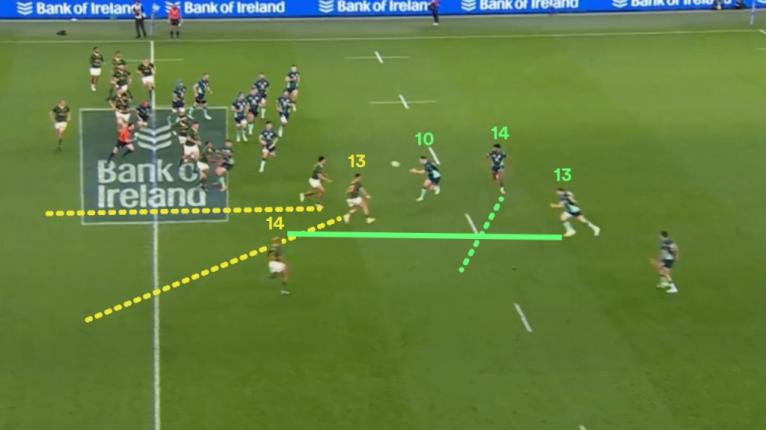
Sexton escaped the pressure with a beautiful tap-on pass that hit centre Garry Ringrose (13) perfectly in stride, who pierced the gap left by Kriel.
But the Irish No 10 took another big hit from the Bok centre.
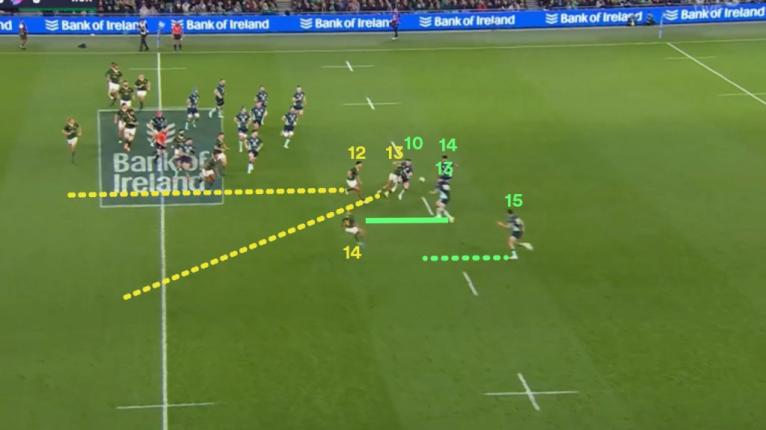
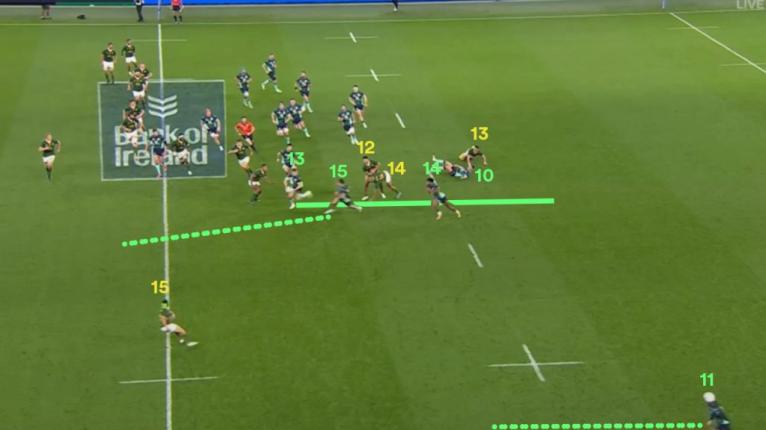
Ringrose was able to link quickly with Keenan (15) to keep the movement alive, but the last pass just wasn’t accurate enough from the Irish fullback, who had to manoeuvre the ball around Cheslin Kolbe.
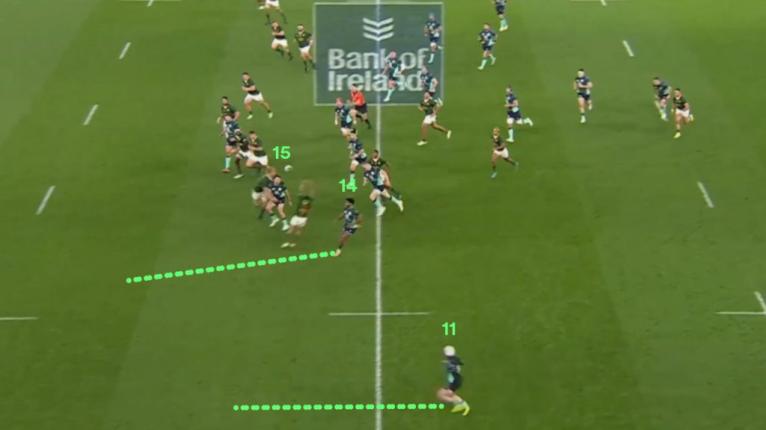
Keenan’s ball was too high for Mack Hansen (11), bouncing off his hands over his head which allowed the Springbok cover defence to eat up the space on the outside and close the threat.

Hansen stepped back inside to settle Ireland’s play where none other than Jesse Kriel was there to make a second tackle attempt in the same phase after delivering the initial hit on Sexton.
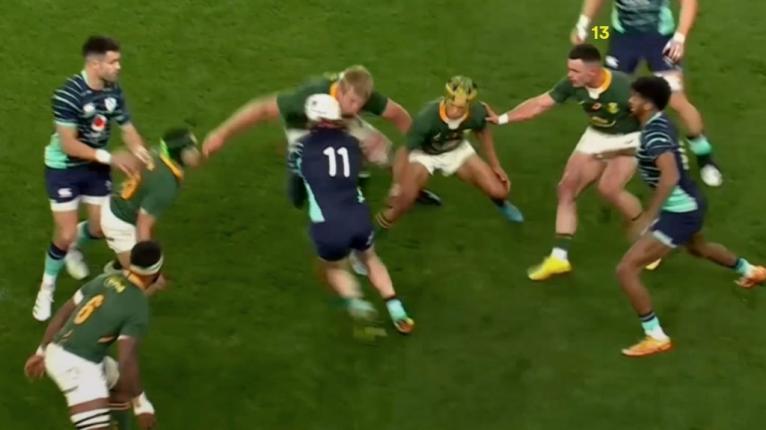
His relentless effort didn’t end there, looping back around to reset the line on the opposite side for the next phase as required by the Springboks’ defence system.
After going wide on the first phase, Ireland looked to hit wide again on the opposite side where they were still resetting their far edge defence, but Kriel was up to the task.
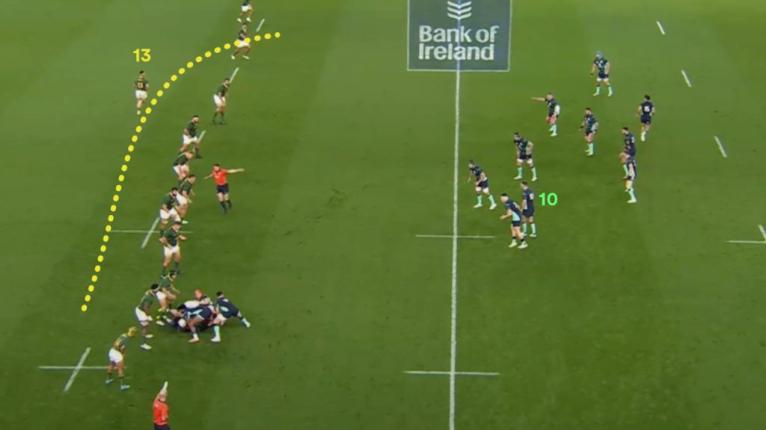
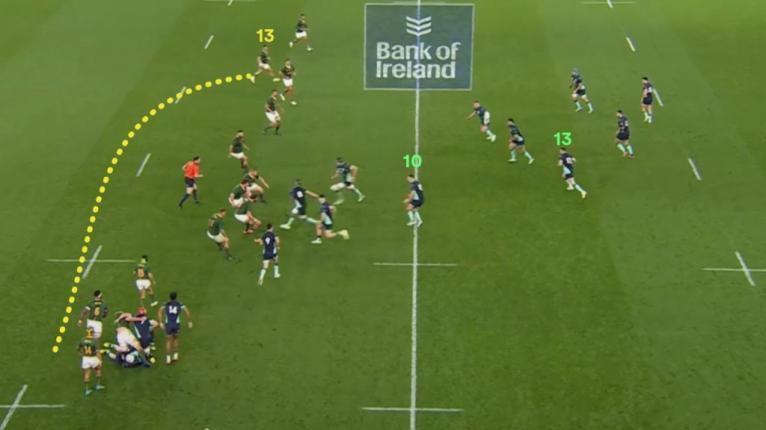
Ireland played out the back twice to find Garry Ringrose (13), but the Irish centre was forced back inside by Kriel, who had cut off his flat running option.
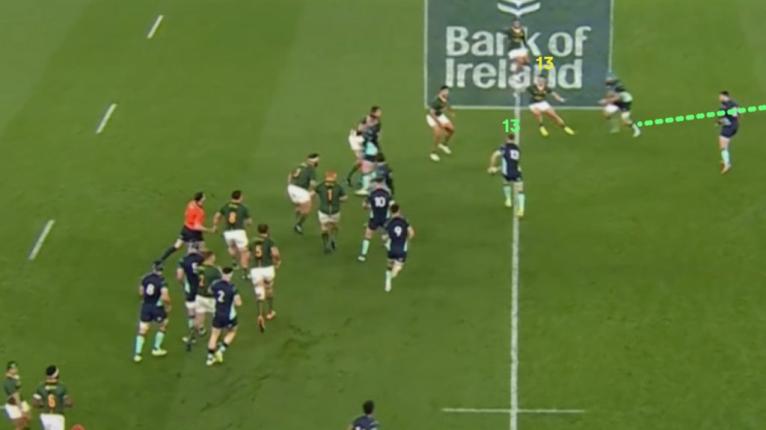
Kriel’s work rate over the two phases was exceptional, blitzing Sexton, recovering off the ground to potentially tackle Hansen on the edge, before reloading on the opposite side of the field and rushing up to funnel play back inside.
It is this kind of off-the-ball effort which has to be delivered to maintain the Springboks’ high-pressure defence. If it isn’t there, it falls apart.
The standard delivered by Kriel on defence on this night against Ireland was above anything that Am has shown over the last three seasons.
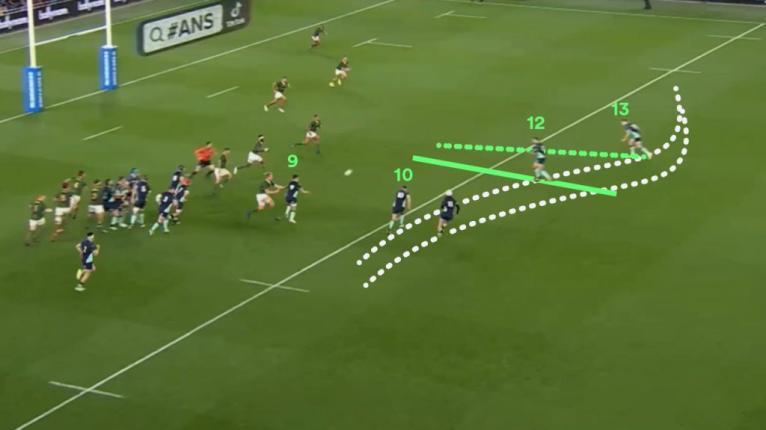
With fullback Cheslin Kolbe in the sin bin, Kriel (13) and Mapimpi (11) combine to shut down an overload play by Ireland in the red zone.
The pullback pass by inside centre McCloskey missed the mark, unintentionally skipping out Sexton.
Kriel pressured Hansen which forced a lollypop pass and Mapimpi closed the deal with a thundering hit on Keenan.
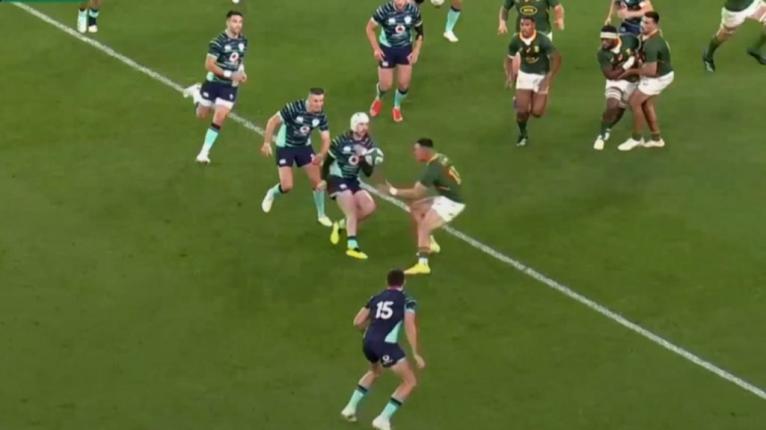
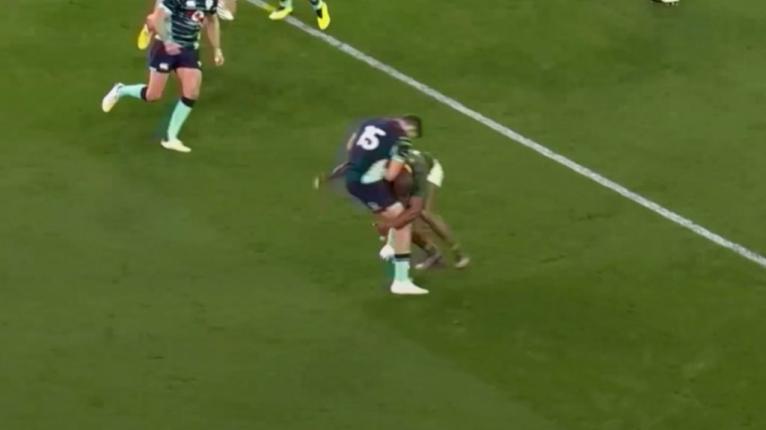
A counter-ruck from both Mapimpi and Kriel forced a ruck penalty and crucial turnover just when Ireland was searching for a big blow.
It was Kriel who covered Ireland’s hooker Dan Sheehan after South Africa’s exit kick had been charged a little while later.
Without the pressure from the Springbok centre, Sheehan may well have scored.
On this kick chase he found himself blocked by Ireland’s retreating players.
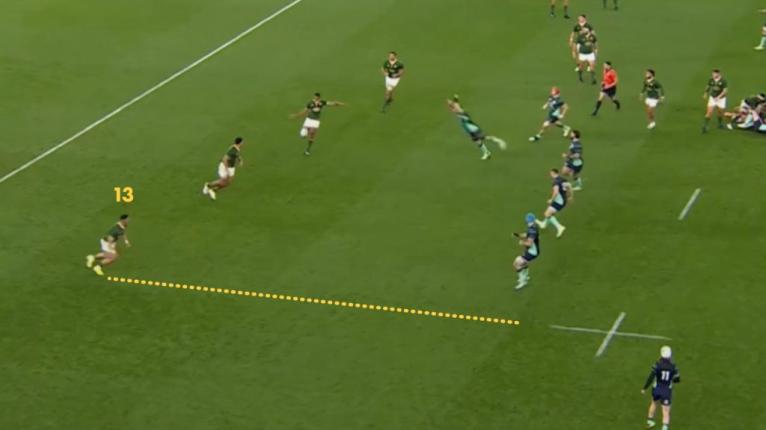
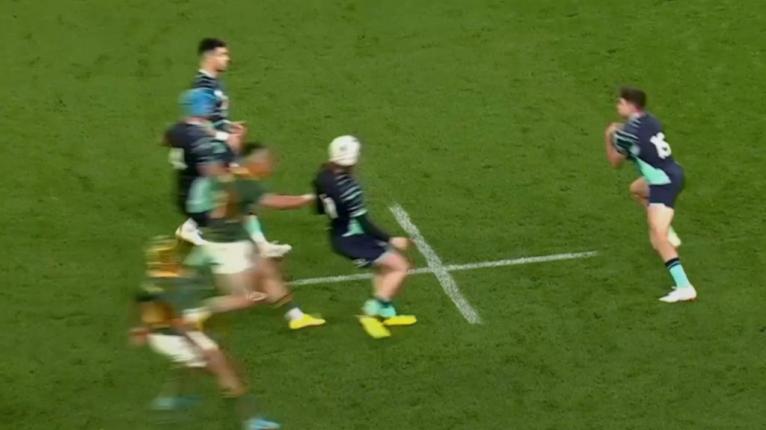
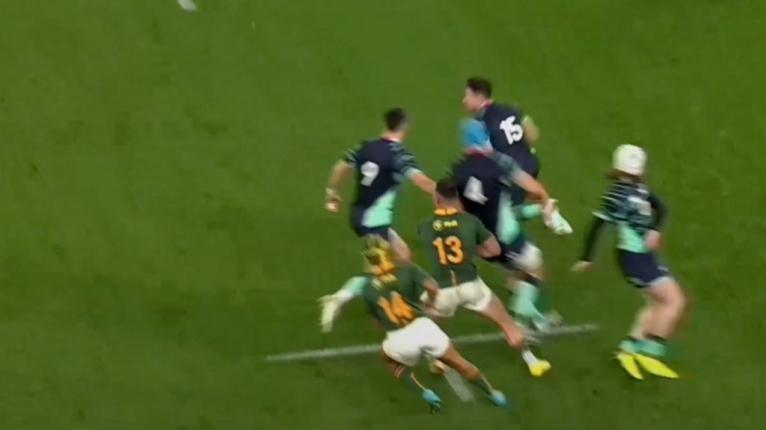
Many players would switch off in this situation and let someone else make the tackle, but Kriel circled back and brought down Keenan.
Kriel’s second effort creates an opportunity to pilfer the ball for South Africa’s second chase line as they no longer have to make the tackle on the Irish fullback.
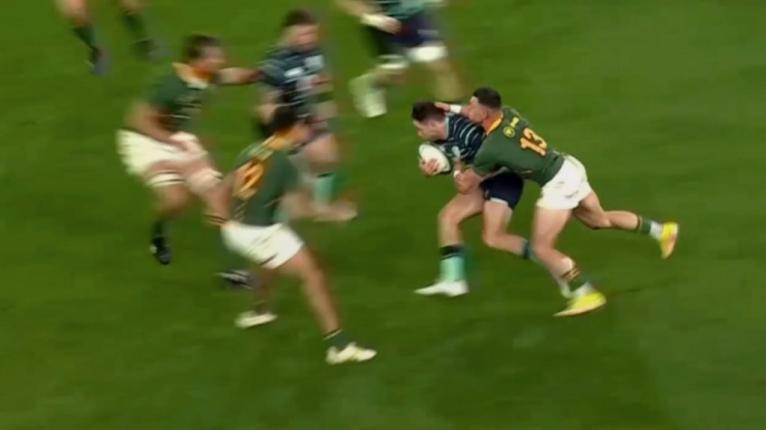
There is no substitute for a player who works endlessly in defence and that is Jesse Kriel. The 29-year-old’s biggest asset for the Boks is his work ethic across the park, tracking endlessly to be there in case he needs to be.
When Ireland face South Africa again in a few weeks time they will have to find an answer to the pressure defence that they couldn’t last November.
During the debate around the RFU’s proposed new tackle heights in March, Ireland’s coach Andy Farrell and captain Johnny Sexton were asked about what they thought about it.
Both opposed the tabled idea by the RFU, but Sexton made a point to reference a different type of tackle.
“Of course we need to get the head shots out of the game, but the tackles we really need to get out of the game are reckless, out-of-control, sprinting out of the line, token arms, hitting someone here [in the sternum]. It shouldn’t be an option,” he said.
It was Jesse Kriel who put the heat on Sexton just months prior to those comments and the Springbok centre got him a few times after the pass was away.
It is perhaps no coincidence Sexton had his worst game in a green jersey in the last decade.
Jesse Kriel might not have the same attacking talent that Am provides, but the Springboks don’t need that against Ireland.
They need someone to throw Sexton off his game and Kriel is that kryptonite.





















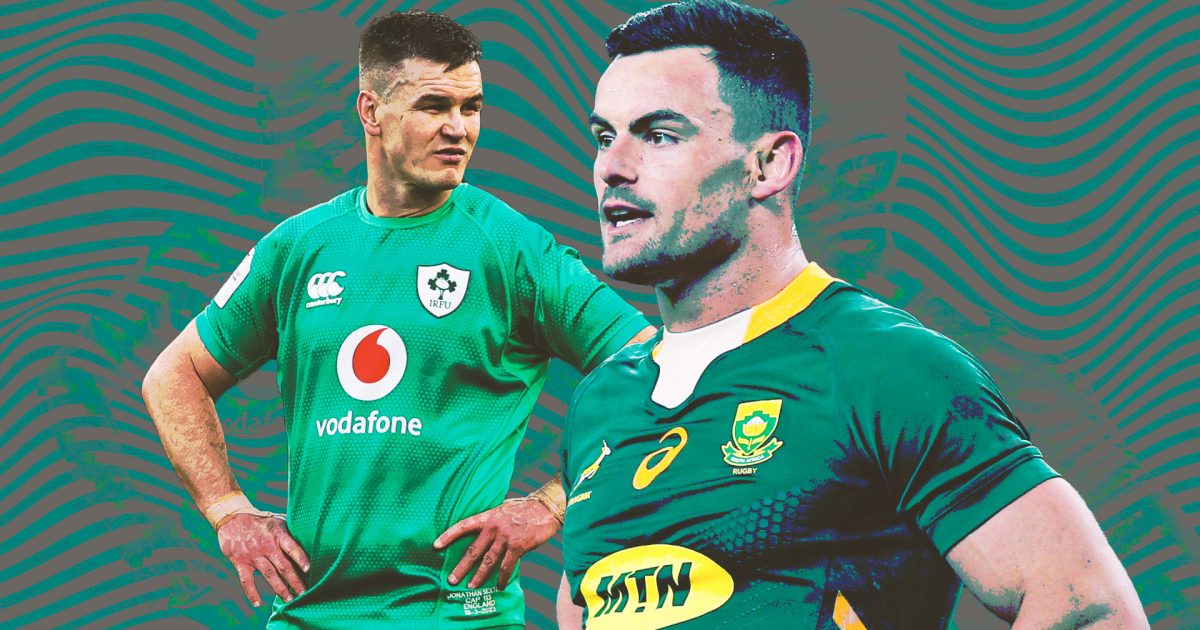

BS, take that Mr Hate Speech
35-7
BS - 💩💩
🤣🤣🤣🤣🤣🤣Sure we always knew Johnny was superman ..Would you ever wise up ..
I'd be more worried about Scotland, the Boks have some crucial players injured, some who were left out entirely, finishing 2nd in their pool was enough in 2019 and is definitely the more realistic goal until the best players in the squad are fit, the Scotland game is the one they need to win.
They are there they on standby and will be based in London. Am, Pollard and see jager on standby they will play watch this space
Absolutely. I'm more worried about Scotland than Ireland. Kriel is a special player who deserve to be in every starting 15.
I'm more worried about our 10. Pollard is a massive loss. To win the RWC you need a world class flyhalf that can operate well under intense pressure. Libbok is talented but falls apart under pressure. Goal kicking wins world cups. And more so with the 2023 RWC. Every match will be tight because of the quality of teams this year. And that is going to be the Boks' downfall.
The Boks' squad selection baffles the mind. Too many allrounders. This is not cricket. You need specialists in every position with a couple of multi-positional players on the bench. Of course I support them, but the Boks are in for a rough ride.